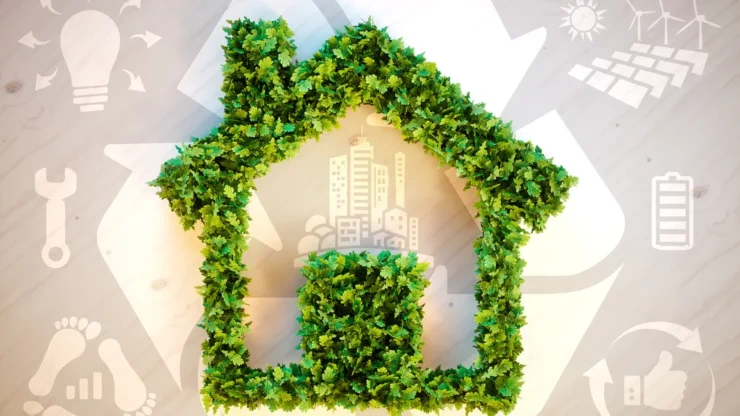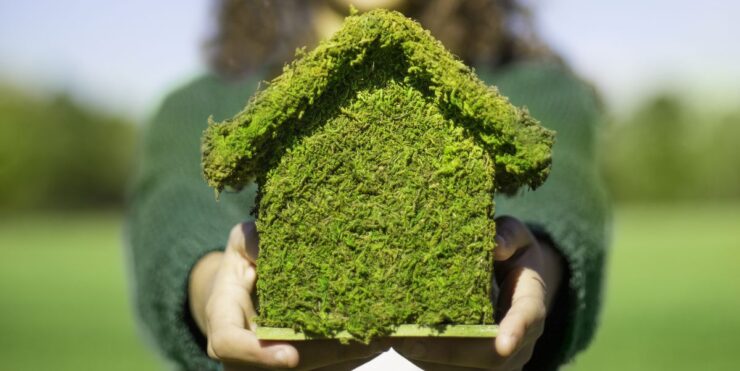Table of Contents
Eco-friendly living is becoming increasingly popular as more people aim to reduce their environmental footprint. While big lifestyle changes can seem daunting, there are many easy and affordable ways to start greening your home. Small upgrades and habit adjustments add up to significant benefits for both the planet and your wallet. Every household doing their part creates positive ripple effects across communities.
Energy Efficient Lighting
One of the simplest ways to reduce your home’s energy use is to upgrade the light bulbs. Replacing outdated incandescent bulbs with LEDs slashes electricity consumption by 75 percent or more to produce the same brightness. They also last over ten times longer, reducing waste from frequent bulb changes. Although more expensive upfront, LED bulbs offer an excellent return on investment from significant long-term savings on utility bills.
Reduce and Reuse Household Waste

Single-use plastics contribute enormously to overflowing landfills and ocean pollution levels. Start making small daily changes to reduce plastic usage at home. Swap paper towels, plastic bags, plastic wrap, and disposable wipes for reusable dishcloths, storage bags, containers made from glass or other natural materials, and personal care items containing sustainable ingredients.
Water Conservation
The average American family uses over three hundred gallons of water daily, placing substantial strain on regional water reserves, infrastructure, and aquatic ecosystems. A multi-pronged approach across activities and systems effectively reduces home water usage. Start with inexpensive low-flow showerheads and faucet aerators while being diligent to turn water off completely when activities allow for it, such as lathering hands when washing and brushing teeth.
Run full loads for dishes, laundry, cleaning to maximize water used per cycle rather than rinsing a few items at a time multiple times per day. Collect rainwater in exterior or underground barrels for later use irrigating gardens and lawns. Add timers, smart controls, or moisture sensor systems on in-ground and hose-end irrigation systems to prevent over-watering relative to weather conditions and plant needs.
Renewable Energy
Burning fossil fuels for electricity leads to air pollution, which then speeds up climate change. An impactful home upgrade option to tackle climate changeinvolves tapping into renewable solar power generation through rooftop home solar panels. According to the people at Vivint Solar, state level incentives plus a generous 30% federal solar tax credit help offset solar installation costs to make going solar very worthwhile long-term for clean power generation.
Solar panel efficiency and battery backup storage capacity continue advancing while costs drop annually. Once installed, the sun’s rays provide free, clean electricity every sunny day for decades. Combining solar panels with Tesla Powerwall or other integrated battery storage optimizes financial return through offsetting peak rate utility costs while providing reliable backup power when grid electricity fails.
Eco-Friendly Cleaning and Personal Care Products

Many conventional cleaning and self-care products contain chemicals like ammonia, formaldehyde, phthalates, volatile organic compounds and artificial fragrances that irritate respiratory systems, provoke allergic responses, disrupt hormones and threaten water reserves once washed down the drain.
Fortunately, inexpensive, safe, effective natural ingredient solutions for household cleaning and personal care exist. White vinegar, baking soda, lemon juice, and odorless Castile tincture soap form effective base compounds for counters, floors, bathrooms, laundry, and windows rivaling commercial brands without caustic residues. Oxygen bleach powder proves powerful on tough stains yet remains far gentler than conventional chlorine bleach demanding careful handling and storage. Essential oils like lavender, eucalyptus, peppermint, and tea tree add sanitizing potency along with fresh, uplifting scents replacing artificial perfumes in room and linen sprays. Reusing glass spray bottles and integrating dish soap dispensers reduces single-use plastic waste streams.
Widespread shift towards plant-based soaps, shampoos and related self-care products reduces demand for palm oil linked to deforestation threatening biodiversity in tropical forests abroad while cutting back on plastic packaging waste. Implementing even modest adjustments towards non-toxic cleaners and personal care items in homes substantially limits volumes of hormone disrupting chemicals entering waterways, soil and air year after year – contributing to healthier ecosystems supporting healthier families and communities nearby and at large.
Green Home Upgrades
More expansive home upgrades involving full-systems improvements or renovations present prime opportunities to embed comprehensive sustainability measures that pay dividends for decades. Swapping older appliances for new energy and water efficient models greatly reduces resources wasted daily on tasks like laundry, running the dishwasher, powering home offices and cooling living spaces.
Expanding renewable generation by adding solar panels and battery systems reduces reliance on fossil fuel-powered grid electricity. Integrating considered green renovation choices spanning full home systems unlocks enormous potential for maximized energy savings and minimized carbon emissions from each forward-thinking household outwards into their broader communities.
Cultivate Eco-Awareness

Promoting environmental awareness and instilling sustainable values transforms thinking driving greener behavior in households and peer circles. Make taking part in recycling convenient by setting up sorted stations with clearly labeled bins. Applying creativity turns recycling and compost hauling into fun family time with themed bins monitored by homemade signs with friendly eco-tips.
Using cornstarch-based packaging and creative reuse, like repurposing glass jars for home organization, provesthat little actions make positive differences. Planning occasional homemade meatless family meals saves massive water resources and land used in livestock production while cutting household food waste and introducing tasty ethnic recipes. Discuss positive ecological news occurring locally and globally, reflecting care for our shared natural world and all its inhabitants.
Conclusion
Small dedicated steps towards environmental responsibility at home scale up to meaningful community impact. The path to truly sustainable living relies on innovation both high-tech, like solar panels, and low-tech through reusable products and natural cleaners coupled with conserving daily habits. Renewable technologies, waste reduction, water conservation and smart energy usage allow residents to collectively slash resource waste and carbon emissions which benefit budgets, wellbeing and the planet. Anyone willing to learn a few easy positive environmental adjustments discovers simple but profound lifestyle shifts. Spreading awareness and eco-friendly action through open conversations and leading by example moves communities increasingly towards responsible green living over coming years.

